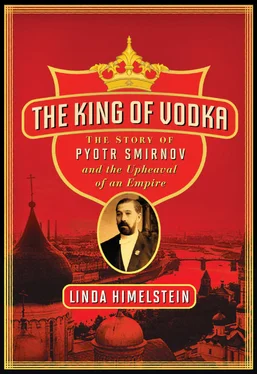His situation darkened even more when Grigoriy died unexpectedly in 1844 from edema. Time did not just seem to stop after that; it appeared to move backward. Little of the details are known about what exactly happened to Grigoriy’s dreamed-about hotel empire, but it seems as if it vanished as quickly as it had appeared. The family, too, appeared to stall. It did not take long for Grigoriy’s wife and sons to fall from the merchant class into the petite bourgeoisie, a rung just above peasant status.
This episode, then, became another valuable lesson for Pyotr: Success was not tangible or guaranteed. It could be there one moment, gone the next.
NOW PYOTR SAW his time in Uglich disappear. In less than a day, he was back where he started, but Pyotr was not the same little boy who had left his village four years earlier. To him, what had once been a comfortable, beloved home, a place full of belonging, felt worn. It was as if life in the village suddenly came into focus, and the picture was dull, as flat as the land surrounding the Yaroslavl province.
Pyotr probably never said a word to his family about his wanderlust. Ever the dutiful son, he had learned not to question his father. Arseniy, a rational, calculating man who did things for a reason, must have had a plan for Pyotr. So Pyotr waited. For almost two years, he went about his business on the farm, performing all the usual tasks.
Arseniy could see that his son was restless and ready to move on— needed to move on, so perhaps it was time. His brother, Ivan, seemed to be gaining both financially and in stature with every passing week. His son, Yakov, gone nearly four years, was thriving, too. He came home from time to time, full of stories about the rush of Moscow, the thrill that permeated the city and created opportunities for anyone sharp enough to find them.
It was time, Arseniy concluded. Pyotr would go to Moscow.
Pyotr probably was up before the sun. So were his parents, who gathered around him. They prayed together as a family, asking for safe travels. His bag was packed. It contained clothes, bread, cheese, water, and small gifts for friends. Pyotr also brought an extra pair of shoes. The walk from his small village would be a long 170 mile journey. [8] The journey to Moscow has been re-created from available records and from typical stories of serfs going to Moscow for seasonal work.
In his jacket Pyotr carried the obligatory passport. It was a permission slip, of sorts, which allowed him to be away from his village and landowner. It listed the usual facts—name, age, physical description, religion, and residence. It also included details about his owner. Pyotr would need this document, purchased for a few rubles, in order to enter Moscow and navigate his way around the city. Anyone caught without a properly issued passport could be severely punished, even exiled to Siberia.
With everything in hand, Pyotr hitched his bag over his shoulder and kissed his family good-bye. Pyotr most likely hooked up with his father’s brother, Uncle Venedikt, for this journey: according to church confession books, they were together in their village and then in Moscow at the same time. The duo made for the dirt road, worn by trading carts that delivered sugar, wheat, and other necessities to Russia’s countryside, that would take them to their first stop. Pyotr and Venedikt likely hopped aboard one of these carts, saving their legs for less well-traveled portions of their journey. They no doubt passed by their friends and acquaintances. Travelers to and from the cities and towns were so plentiful that each village had a person specifically designated to welcome them with tea, food, and shelter.
This road was familiar to the fifteen-year-old Smirnov. It was the same one he had traveled en route to Uglich. So he moved with a confidence not expected of a boy embarking on his first expedition so far from home. He stopped with his uncle for some tea at a nearby village before continuing on the twenty-two-mile stretch that would take him back to Uglich. The trip was straightforward—except when the couple arrived at the Volga River, which they had to cross to get to Uglich. There were no bridges or makeshift paths to follow, so they had to find a ferry-man willing to take them along for the ten-minute ride.
Pyotr basked in those moments. Beyond the water, Uglich looked beautiful, just as Pyotr remembered it. He could see the golden domes from the churches in the distance as well as the former residence of Ivan the Terrible’s son, Dmitriy. He also heard a chorus of bells coming from the cathedrals as worshipers entered for their late afternoon prayers. The melody comforted Pyotr. Yet he practically flew off the ferry as it connected with the shore, so anxious was he to get on with his journey.
Once on the other side, he made his way with Venedikt to the center of town, where they sought out Pyotr’s older sister, Glafira, who had married the son of a beer factory owner in Uglich. They would stay with her for the night.
The next day was much the same, beginning with a prayer followed by long stretches of walking. Every now and then, Pyotr and Venedikt would climb aboard a passing dray. Often, the draymen would sing old Russian tunes. Pyotr listened to the music from his childhood while he studied the dense forests and ravines going by. The leaves had begun to turn bright shades of red and gold even though it was not yet autumn. The days still had the feel of summer in them.
The nights were getting cooler, though, and they came too quickly for Pyotr. The darkness slowed the uncle and nephew down, forcing them to find a patch of grass or a room in a friendly shelter. Pyotr would have preferred to have kept moving, anxious to get to Moscow. In his brief life, he had always had his father to guide him and instruct him. He was the obedient son, never questioning his elders’ wishes. But now, even with Venedikt at his side, Pyotr felt as if he were on his own, able to choose when to stop for bread and where he would rest. It brought out powerful feelings inside him, urges that he had not really understood were there before. At first, he tried to suppress them, thinking it unbecoming of a Christian boy in a staunchly patriarchal society to embrace so fully the idea of independence or of self. But Pyotr could not deny the truth—he liked navigating his own way.
And he was good at it. Pyotr and Venedikt made superb time. By the seventh day, they were closing in on Sergiyev Posad, perhaps the holiest site in all of Russia since its founding in 1340. They could see the fortress monastery in the distance, surrounded by dark pine forests. The trees framed the church’s blue and gold domes, which shot bright reflections into the light blue sky. Pyotr sat in awe as he looked out at the horizon. He had heard about this place, and now, seeing it in the distance, he felt a sense of deep spirituality. He quickened his step, anxious to get a closer look.
The road had swelled suddenly with a crush of people. Most, like Pyotr, were traveling by foot. But the more well-to-do came by stage coaches usually pulled by a team of four horses. France’s Alexandre Dumas came to Sergiyev Posad some years later by this kind of coach. However people arrived, many were unified by their motivations to be at this sacred place—to pray for whatever their lives lacked. More specifically, they had come to kiss the bones of St. Sergiy, a famous Russian saint.
The bones were kept in a small white chapel inside the vast compound. Pyotr and Venedikt threaded themselves through small openings in the crowd. A monk marked the doorway, guiding them and others through a narrow entrance surrounded by dimly lit candles. The saint’s bones, set in the center of the room, high atop a long table, were covered with a pink shroud. Finally it was Pyotr’s turn. He followed the lead of others, bending down and kissing the embroidered cross on the pink covering and then backing away. He crossed himself in the elongated Russian Orthodox manner with his right hand and turned to exit, allowing the waiting masses to inch closer to the holy relics.
Читать дальше












